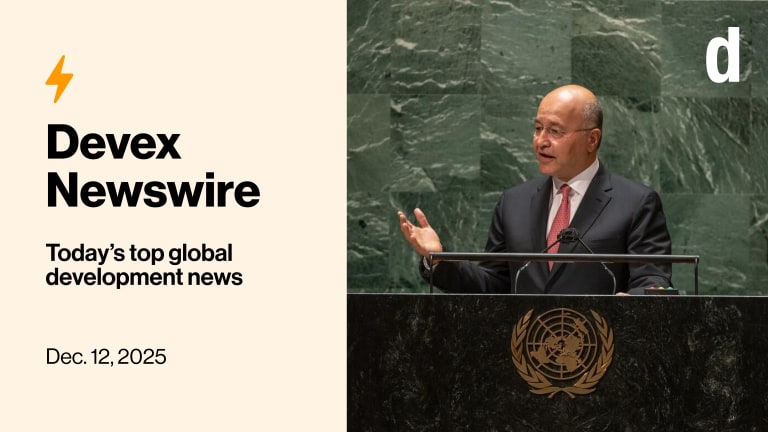
NEW YORK — Gender-sensitive big data is ready to integrate with more traditional datasets that could help track progress on the Sustainable Development Goals, new research released by technical and advocacy platform Data2X shows. But this step forward comes with its own unique challenges of participation and governance, according to data experts.
As the collection of inclusive data has progressed since the launch of the SDGs in 2013, the issue has become more nuanced, going far beyond addressing gender data gaps, according to Eleanor Carey, senior technical manager at Data2X.
“You have got to be able to push for accountability because data is not going to do it on its own.”
— Sunita Kishor, director, the Demographic and Health Surveys ProgramGovernance, access, and privacy were three concerns voiced repeatedly during Data2X’s Tuesday event, which saw the launch of its new report. The all-day event drew members of the private sector, including Facebook and Vodafone, as well as representatives from academia, nonprofits, United Nations agencies, and major philanthropies such as the Bill & Melinda Gates Foundation.
“A few years ago, the conversation was: What data is there? Nobody really knew what data is available and what it could be used for. Now, the conversation is a little bit more about knowing what is available and how to access it,” Carey told Devex on the sidelines of the event.
Available government data is often out-of-date and not disaggregated by sex and other identifying factors. Big data also typically fails to capture accurate demographics, as an estimated 200 million fewer women than men are online.
The result is a data picture that is not representative of the voices and needs of women, girls, and others who are not officially counted.
The Data2X report offers major takeaways from 10 different studies that were funded by the data partnership. Overall findings from the studies show that big data — or very large datasets that can be collected, for example, from mobile phone data — offers unique insight on women and girls, and it can be scaled to integrate with traditional datasets, such as household surveys. But there is a need to identify and correct bias in big datasets as well as to protect the privacy of women and girls, according to Data2X.
One new study by researchers at the World Bank and Brown University shows that while women in Delhi perform better than men on high school exams, women choose poorer-quality colleges in the city. Women also spend more time on public transportation and accept longer commutes to travel safe routes across India’s capital. The researchers used a combination of student surveys, Google Maps data, and crowdsourced information from mobile applications to produce their results.
The Stockholm-based Flowminder Foundation, meanwhile, used government health survey data, geospatial information from open-source platforms, and mobile SIM card databases to develop sex-disaggregated maps on women’s engagement in agriculture livelihoods across the country. One complicating issue in identifying phone usage — and mapping gender-specific trends — is that families routinely share SIM cards.
Governance is one key factor in moving data collection and analysis forward, according to Mayra Buvinic, senior fellow at Data2X.
“We have a lot of data gaps, but increasingly we have a lot of data. ‘Are there effective policies?’ is another question,” Buvinic said during the event.
Open data sources offer one answer on how to use data to encourage policy change, according to Sunita Kishor, director of the Demographic and Health Surveys Program, a USAID-backed initiative that provides technical assistance on demographic and health surveys in over 90 countries. Increasingly, the DHS Program is complementing traditional datasets with big data sources, Kishor said.
“There is a lot of data that is actionable. How do we teach and encourage people to use the data that is out there?” Kishor said during the event. “You have got to be able to push for accountability because data is not going to do it on its own.”
But there are privacy and safety issues, especially for women and girls, when it comes to open data, according to multiple speakers, including Alex Pentland, professor of media arts and sciences at the Massachusetts Institute of Technology. Backlash to privacy concerns around big data, in particular, is likely to escalate, he said. It’s key that people — especially women — are in control of their own personal data.
It’s also a question of how to best utilize big data, according to Carey, and recognizing that it is not an automatic fix to data-collection gaps.
“It’s not thinking that big data will solve every problem, but thinking really smartly about where it can be brought to scale, or, for instance, where it is not that helpful,” Carey said. “Now there is a feeling that we pretty much know what works. We know that there are good applications we should be using, so how do we really scale it? How do we build collaborative models that can help us do this?”






